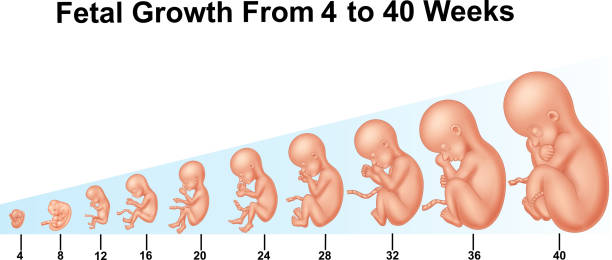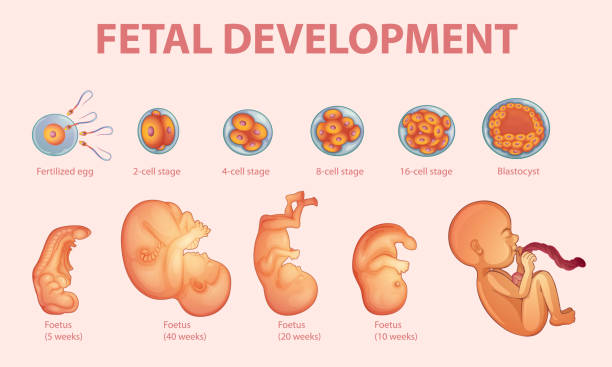Introduction
Today we talk about The Science of Fetal Development: How Your Health Affects Your Baby. Your baby’s health and development depend a lot on your health. Embryo development is a complex process that is influenced by many factors at each stage. In this article we see how your health affects your child’s development and how you can improve your health to ensure your child’s health. Through your article 15 topics you will explain in detail how your lifestyle and health practices affect your baby’s growth and development.
1. Basics of Fetal Development
Understanding the basics is essential for fetal development. When a sperm and egg are fertilized, a zygote is formed, which then divides into an embryo. This embryo goes on to convert into a fetus. At each stage, embryonic development occurs in a specific sequence influenced by genetic and environmental factors.
2. Maternal nutrition and fetal growth

Maternal nutrition has a direct effect on fetal development. If your diet is balanced and you are getting the necessary nutrients, your baby will develop healthy. The function of vitamins, minerals, and proteins has adverse effects on fetal development. After all, maintaining a healthy diet is very important.
3. Prenatal vitamins and their importance
Prenatal vitamins given to pregnant women are important for the development of the fetus. These vitamins are rich in folic acid, iron, and calcium, which are essential for the development of the baby’s brain, spine, and bones. Daily intake of vitamins ensures healthy development of the fetus.
4. Maternal health conditions and their effects
Maternal health conditions such as diabetes, high blood pressure, and thyroid problems have a significant impact on fetal development. If you don’t manage the conditions properly, they can have long-term effects on the child’s health. Regular check-ups and medical advice are essential to control these conditions.
5. Stress and fetal development
Stress and anxiety also affect fetal development. High levels of stress hormones such as cortisol have a negative effect on the fetus, affecting the child’s brain development and overall health. Stress management techniques and relaxation techniques are beneficial for fetal health.
6. Physical activity and pregnancy

Physical activity is also important during pregnancy. Moderate exercise such as walking and swimming improves maternal health and supports fetal growth. But, strenuous physical activities should be avoided which may increase the risk of complications.
7. Alcohol and drug abuse
Alcohol and drug use during pregnancy can have serious effects on the health of the fetus. Alcohol use can increase the risk of fetal alcohol syndrome and drug-induced birth defects. What is taken, should be avoided during pregnancy.
8. Smoking and its effects
Smoking is also harmful to the development of the fetus. Nicotine and other chemicals found in cigarettes reach the fetus through the placenta and have negative effects on the baby’s growth and development. Quitting smoking is an important step for a healthy pregnancy.
9. Hydration and fetal health
Adequate hydration is also essential for fetal development. Adequate water and fluid intake maintains maternal blood volume and aids amniotic fluid production. This duo helps ensure the growth and health of the fetus.
10. Environmental toxins and their effects
Pollutants and harmful chemicals like environmental toxins also affect fetal development. Exposure to these toxins during pregnancy increases the risk of fetal health problems and birth defects. After all, it is important to maintain a clean and safe environment.
11. Regular prenatal check-up

Regular prenatal checkups and screenings monitor fetal health. These check-ups assess your and your baby’s health indicators and detect any potential problems early. Also, scheduled appointments should not be missed.
12. Emotional support and pregnancy
Emotional support and social interactions are also important during pregnancy. Positive communication and a supportive environment promote maternal mental health, which indirectly supports fetal development. Support from family and friends is important.
13. Sleep and its role
Adequate sleep is also essential for the health of the mother and the development of the fetus. Adequate sleep allows your body to rest and rejuvenate, which is essential for healthy baby development. Sleep patterns are important to manage during pregnancy.
14. Education and awareness
Antenatal education and awareness is also important. Knowledge about healthy pregnancy methods, potential risks, and precautions helps you make better decisions. Educational resources and prenatal classes inform and prepare you.
15. Postnatal health and fetal development
Postnatal health is also important for fetal development and overall child care. After delivery, it is important to maintain maternal health and practice self-care practices to support the baby’s growth and development.
Conclusion
Today we talk about The Science of Fetal Development: How Your Health Affects Your Baby. Fetal development is a complex process that is closely related to your health and lifestyle. Your diet, physical activity, stress management, and overall health have a direct impact on your baby’s growth and development. By adopting healthy pregnancy practices, you can give your baby the best start and ensure their overall health. Through the article, we hope you have understood the importance of fetal development and maternal health in the right way.
